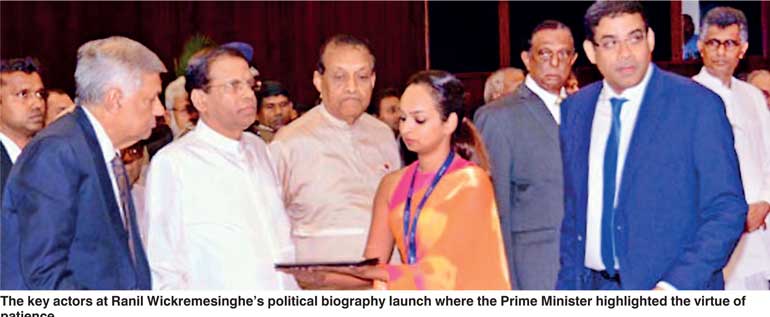A Brief Colonial History Of Ceylon(SriLanka)
Sri Lanka: One Island Two Nations
A Brief Colonial History Of Ceylon(SriLanka)
Sri Lanka: One Island Two Nations
(Full Story)
Search This Blog
Back to 500BC.
==========================
Thiranjala Weerasinghe sj.- One Island Two Nations
?????????????????????????????????????????????????Saturday, January 20, 2018
MS-RW Unity Govt. must stay united for the sake of the country

 Friday, 19 January 2018
Friday, 19 January 2018 A few days after the Unity Government celebrated its third anniversary, President Maithripala Sirisena asked the Supreme Court: “Whether, in terms of provisions of the Constitution, I, as the person elected and succeeding to the office of President and having assumed such office in terms of Article 32 (1) of the Constitution on 9 January 2015, have any impediment to continue in the office of President for a period of six years from 9 January 2015, the date on which the results of my election was declared.” The Supreme Court said it is five years.
The next bombshell was on Tuesday at the Cabinet when an emotional President walked out of the Cabinet meeting after voicing disappointment over criticism levelled against him by some United National Party lawmakers.
President Maithripala Sirisena told the Cabinet on Tuesday that he was not an “ungrateful or inhuman” person who has forgotten the help he received during the presidential election. But he had to do something about the bond scam. It was too big to be ignored. The President was responding to some of the criticism levelled at him on various political stages in the run-up to the Local Government elections.
The hard truth
 For
President Sirisena, leading the nation through a ‘Unity Government’ is
itself a challenge. Irrespective of the claim by the UNP or the JVP that
it was they who made Sirisena the President, the fact was the
Opposition did not have a candidate who could muster 50% of the votes
needed to defeat Rajapaksa, given the power and resources the Rajapaksa
family wielded.
For
President Sirisena, leading the nation through a ‘Unity Government’ is
itself a challenge. Irrespective of the claim by the UNP or the JVP that
it was they who made Sirisena the President, the fact was the
Opposition did not have a candidate who could muster 50% of the votes
needed to defeat Rajapaksa, given the power and resources the Rajapaksa
family wielded.This was the case earlier too, as they sacrificed their stake and pitted former Military Chief Fonseka to contest the former President. The outcome in the 2010 presidential election was a total disaster for the Opposition. Maithripala Sirisena on the other hand took a huge risk and with his partners (UNP, JVP, TNA and civil society) rescued Sri Lanka from a slide into increasingly nationalist authoritarianism. The incredible victory of a broad coalition representing Sinhalese, Tamils and Muslims gave hope to the country that finally it could address its longstanding political challenges: remedying the 60-year failure to grant Tamils a fair share of power on the Sinhala-majority island, and restoring for all citizens the rule of law, damaged by decades of politicisation, bitter ethnic bias and impunity.
According to diplomats, the democratic benefits from the defeat of Mahinda Rajapaksa and the removal of his family and supporters from key Government positions is still huge.
Grateful
Despite the President repeatedly saying he is not an “ungrateful or inhuman” person who has forgotten the help he received during the presidential election from the UNP, JVP, TNA and civil society, the President firstly, secondly and thirdly has to be grateful to the ordinary people of this country for electing him as the President. It is they who wanted the change and made it happen.Therefore given that this Unity Government has less than 24 months to deliver, it is time MS and RW reconcile and bring back the people who took the risk to put this Government together to the forefront. This Government in the eyes of the public has got hijacked by people who were openly supporting the Rajapaksa re-election campaign or were watching the fun on the sidelines or living overseas, but descended very fast when Maithripala became President to take up key positions in the administration.
Media responsibility
The Unity Government under the President and PM has achieved a lot; but a lot remains to be done. Understandably, many criticisms are being made of the Unity Government set up by the UNP and the President because they promised to run a clean administration and have fallen short. Some of them are fair and some are total distortions.Ironically, the most vociferous are the print media and TV. They need to be grateful for the new freedom they have got. Simply lashing out at the President and the Prime Minister the key architects of the revolution of 8 January would not help their cause in the long-term. One reason for this adrenaline rush, is that the press finds, at last, some opportunity for enlarged circulation as it creates news and even creates conflict. “Controversy” is always possible and loved by press people and the media. Also, social media has been unaffected as it is free by definition.
The Prime Minister is often the main target and he is accused for all the bad things that happens in the Government. Why? Because, from the Opposition point of view he is the key to the survival of this Government. If he is out, the Government falls and President Sirisena will have an uphill task keeping a Government together. Ranil no doubt is the brain behind the Unity Government’s way forward.
Local elections
Looming large now is the local elections, originally due in 2015 but repeatedly postponed according to the JVP for fear the SLFP might trail not only the UNP, but also the Rajapaksa faction, which operates in Parliament as the “Joint Opposition”. Three provincial council polls, with the same risk for SLFP, are also scheduled in 2018.The SLFP is a resentful junior coalition partner, whose ministers see uniting their own party as a top priority – thus making peace with Rajapaksa as the best way to regain control of government. The Rajapaksa clan would however need to overcome significant hurdles to return to power. The earliest that Parliamentary elections can be called for is 2020.
A more likely scenario is the deepening conflict in the coalition, as the SLFP bides its time and prepares to regroup for both Parliamentary and presidential elections post 2018. Meanwhile, the Rajapaksas are doing whatever they can by exciting their base, attacking constitutional reform and transitional justice as capitulation to anti-Sinhala and foreign forces. The rising COL and the bond fiasco is also helping their effort to create chaos in the rural areas and incite the unions.
Future
The Government requires to retain the support from the three key constituencies that brought it to power: reform-minded Sinhalese, Muslims, and Tamils, while a few from these groups are likely to support the Rajapaksa-led Opposition.Rebuilding trust in the Yahapalanaya Government requires compromise and balancing expectations and risks across a spectrum of challenges and very importantly the President and the Prime Minister accepting the fact that they need each other for this Government to succeed.
At a minimum, the President and Prime Minister need to agree on a five-point program of renewal: Set up an UNP-SLFP economic team to develop and oversee consensus policy on economic reforms and sharing short-term hardships more equitably. They need to launch a campaign for a new, more democratic, pluralist constitution, including increased devolution, and commit to achieving the two-thirds majority needed in Parliament, while building support to win a referendum.
If more time passes without prosecution of major corruption and crimes, the more people will lose faith in the President and the Prime Minister. The Government would then have lost its most powerful asset and have to face an election with nothing much to talk about other than the 19th Amendment. The country can certainly achieve a lot if the Unity Government can focus on the political and economic reform and on some of the tangible results the people want and also prevent chauvinism and extreme religious opinion taking over the national agenda. And here lies Sri Lanka’s future.
(The writer is a thought leader.)

